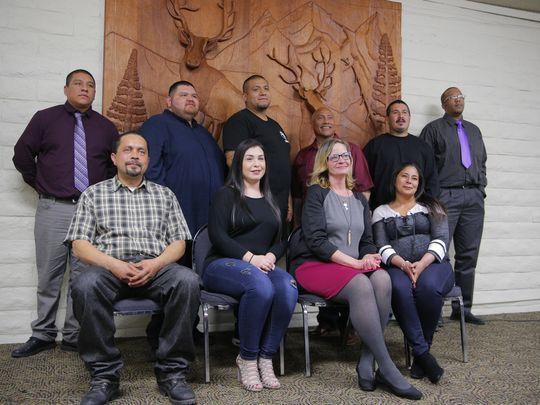Monterey County reentry program graduates ready for change
February 14, 2018
From The Californian
Sharon Barajas has gotten her life together at the Monterey County Day Reporting Center after being placed on felony probation, Barajas told a roomful of people in Salinas on Monday night.
“I wasn’t doing very well, I wasn’t on a good path and I needed a wake-up call and this definitely was the start of a new life for me,” said Barajas.
Barajas is one more than a dozen probationers and parolees who were recognized Monday at a transition ceremony for graduating from the Monterey County Day Reporting Center by GEO Reentry Services, in collaboration with the Monterey County Probation Department and the California Department of Corrections and Rehabilitation.
Barajas said moral recognizance therapy was the best course she took while she was in the Monterey County Day Reporting program.
“It helps you realize and admit that you are not powerless over your life, that you are in charge of your own happiness and your own sadness,” said Barajas. “It helps you deal with some stuff that maybe you weren’t willing to deal with before.”
Barajas said she is pursuing her associate’s degree at Hartnell College and hopes to then transfer to a four-year university and eventually become a writer. Barajas said she would like to help the homeless as well and would like to write books surrounding homelessness.
GEO Reentry services provides cognitive behavioral programming services to government agencies, said Amanda Owens, area manager for GEO reentry in Northern California.
“The Monterey County Day Reporting Center is a cognitive behavioral change program designed to work with high-risk offenders who, without any type of treatment or resources, would probably not be successful without supervision,” said Owens.
Owens said they look at the risk needs, including areas of one’s life that are most likely to cause people to recidivate, and by targeting those risk needs, it reduces the likelihood that they will re-offend, said Owens.
“We offer a wide range of services, whether it be substance abuse programming, anger management, life skills,” said Owens. “At the end of the day, the main piece is the cognitive piece to try and get them to change their thinking. A majority of our population has anti-social attitudes, values and beliefs that are deeply rooted and the reason why they’re in the system in the first place.”
Jesus Martinez, a 32-year-old King City native, was in the program for six months and described Monday’s ceremony as an accomplishment.
“In the beginning, it was a little nerve-wracking, a little hard, but you just got to be real in everything,” said Martinez. “Everyone treats you right with equality, they give you that respect that makes you feel comfortable. Being with those kinds of people doesn’t make it hard to just keep on pushing.”
Martinez said the past is the past and said he landed in the program at the perfect time because he was ready.
“I was ready for change, I was already making those steps, I was making the effort and reaching out,” Martinez. “Landing here was a good helping hand. I was reaching out for a better life, striving for something better, seeking something more than just a negative lifestyle.”
Martinez said he has a lot of goals moving forward, including a goal of opening a woodshop.
For an individual to qualify for the program, they must be on probation with the Monterey County Probation Department or be under the supervision of parole with the California Department of Corrections and Rehabilitation but must be referred by one of the two agencies, said Owens. They must also be a certain risk level - medium- to high-risk to re-offend, said Owens.
There is no timeframe on how long someone remains in the program and their completion depends on their behavioral changes throughout their tenure in the program and the community, said Owens.
“You can’t just come in and do time for 90 days and then you’re done,” said Owens. “Everyone’s different and they have to truly show behavioral change in order to progress through the program.”
The program revolves around the needs of the individual and includes classes and mentorships that range from substance abuse and employment training, said Owens. All the courses and programs are cognitive behavioral therapy-based to restructure an individual’s thinking, said Owens.
Marcia Parsons, chief probation officer for Monterey County, said Monterey County has contracted GEO to provide services for Monterey County residents since 2009 and notes the collaboration has been successful.
Parsons said that they haven’t tracked recidivism rates for a few years now but the numbers were positive in the past. She added that the county is getting ready to track those numbers again.
“They deal with a very challenging population but they are pretty much the experts in the field,” said Parsons. “You really want to change their criminal thinking.”
“It’s very satisfying to see them graduating and to hear them talk and their speech that they give articulates that they have had some changes in their criminal thinking,” said Parsons. “It’s a long journey for them, but a lot of them make it.”
By: Cristian Ponce, The Californian

